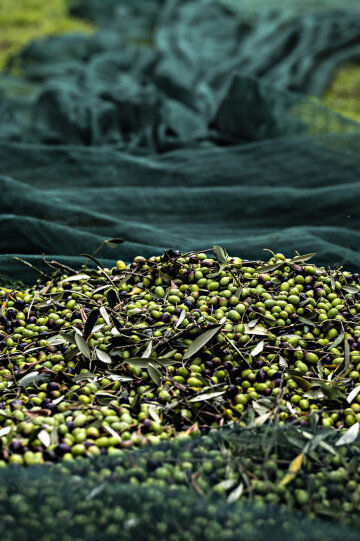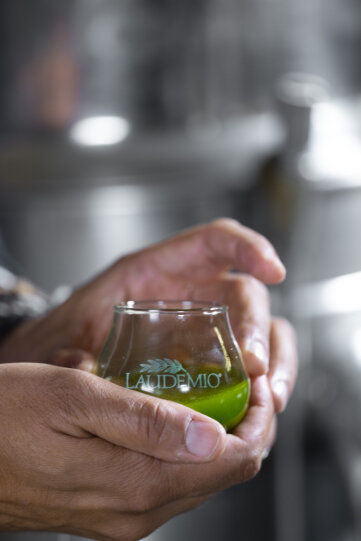
Can expired olive oil be used? We know you have asked yourself this question at least once. The answer is yes, but it depends.
If an oil exceeds its expiration date, it isn't harmful to health, but it will certainly lose some of its properties.
For this reason, it is essential to purchase oil carefully by reading the label, using and storing it properly, and making good use of it even after its expiration date.
Read on to learn all about olive oil expiration, the factors that affect it, and whether expired olive oil can be used and how.
Can Olive Oil Spoil
Currently, olive oil bottles are typically labeled with an expiration date denoted as 'best before...'. However, prior to 2016, the labeling convention was uniform for all oils, indicating a fixed expiration date of 18 months after bottling.
But how to tell if a bottle of olive oil is still good? Unlike milk, an old olive oil poses no harm, yet it undoubtedly loses its organoleptic and nutritional qualities that define a high-quality, well-preserved product. Conducting an olfactory analysis can help you in determining the freshness and quality of the oil, as aged oils emit a pungent, unpleasant odor.
The recommendation is to utilize olive oil within 12 to 18 months of bottling, with the International Olive Council suggesting not to exceed 24 months. Nevertheless, this timeline can vary based on various factors. Let's explore them further.
Factors That Influence The Shelf Life of Olive Oil
The expiration date of extra virgin olive oil can be influenced by different elements:
- Cultivar Type: The variety of olives used for oil production plays a significant role. Different cultivars have varying purposes and thus affect the oil's shelf life;
- Storage Conditions: Poor storage can render the oil unusable even before the labeled expiration date (but we will return to this shortly). The color of olive oil serves as an indicator of storage quality; a very dark hue may signal the start of the rancidity process;
- Acidity Levels: Higher acidity in olive oil correlates with a shorter shelf life. Oils with lower acidity tend to last longer.
- Filtration Process: Unfiltered olive oil tends to expire and lose its properties sooner than filtered counterparts. For instance, Laudemio Frescobaldi oil undergoes double filtration before bottling to enhance longevity.
Polyphenols, which contribute to the oil's bitter and spicy taste, also possess important beneficial properties. The quantity of polyphenols significantly influences the oil's expiration date:
- Oil with a low polyphenol percentage, characterized by slight fruitiness, typically lasts up to a year.
- Oil with a medium polyphenol percentage, featuring moderate fruitiness and bitterness, can endure beyond a year.
- Oil with a high polyphenol percentage, offering a pleasantly bitter and spicy taste, can retain its properties for up to two years after bottling when stored properly.
In the case of our Laudemio Frescobaldi olive oil, since it contains a high percentage of polyphenols and low acidity (both signs of high quality), the maximum allowable expiration date of 24 months is assigned.



Optimal Use of Extra Virgin Olive Oil
If the olive oil's expiration date is still distant, the priority is to preserve its quality to fully enjoy its benefits.
Prepare quick and easy recipes with olive oil, relishing its freshness and savoring its rich flavor and aroma. Did you know that frying with olive oil is a healthier choice?
Now, let's explore some tips on how to maximize its shelf life.
Storing tips to delay olive oil expiration
When storing olive oil, it's crucial to protect it from its three main adversaries: high temperatures, light, and oxygen. Proper management of these elements significantly influences the shelf life of olive oil.
Here's what you should do:
- Avoid exposing the container to sunlight or artificial light: a dark bottle helps longevity, like the one used for Laudemio oil;
- Ideally, the oil should be stored at a temperature between 12 °C and 18 °C, in a cool, dry place;
- Airtight sealing is essential to ward off any danger of oxidation (prefer anti-racking caps to old oil jars).
Inadequate storage can lead to the worst consequence: rancidity. This occurs due to oxidation and decomposition of the oil's fatty acids, resulting in changes in its color, unpleasant odor, altered taste, and the formation of harmful substances through chemical reactions.
For responsible consumption, purchase only as much oil as needed each year to avoid it expiring before use. Follow these guidelines to preserve its properties and maintain its freshness.
Expired Olive Oil: How Long After Expiration Can You Still Use It?
There are no health contraindications to consuming recently expired olive oil. It can still be safely used, even for frying.
After using all the remaining oil, ensure to clean the bottle thoroughly to remove every drop before disposing of it. If you have expired olive oil that you no longer need, dispose of it properly in designated waste oil containers.
Final Considerations on Extra Virgin Olive Oil Expiration
We have discussed the importance of extra virgin olive oil expiration and how it affects the quality and safety of the product. There are various factors that can affect the shelf life of olive oil, including the type of cultivar, storage method, and polyphenol content.
We recommend using olive oil before its maximum expiration date to ensure an optimal culinary experience and to reap all its health benefits. Always opt for the highest quality products, such as our Laudemio Frescobaldi olive oil, which is meticulously cared for throughout every stage of production until bottling. However, remember that proper storage ultimately falls on your shoulders. And don't worry if you find yourself with expired olive oil - it can still be utilized for frying.
Follow our tips to make the most of this valuable ingredient.